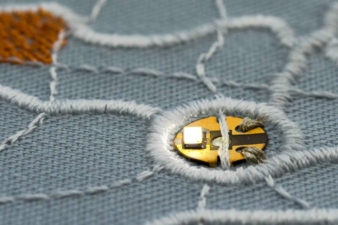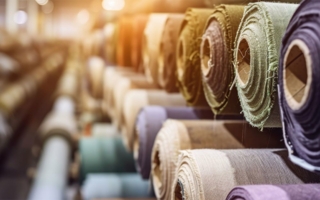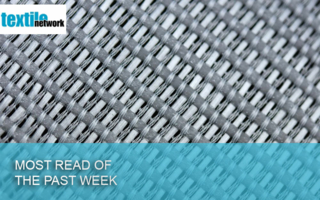29/11/2019 – Closing the gap and avoiding the ‘valley of death’ — auf Deutsch lesen
Imbut GmbH, Greiz
Most of the sixteen German textile research institutes formed research and production companies some years ago. This time, the focus is on Greiz.
By significantly shortening the timescales, they help to bridge what has become known as the ‘valley of death’ between research and industrial application. What do the institutions themselves get out of this and what do their customers say? Our four-part series provides answers from Aachen, Denkendorf, Greiz and Rudolstadt.
Elitex
Even today, Imbut is still closely associated with the product name Elitex which was the first highly conductive yarn made from silver-coated polyamide. The research breakthrough came in 2003 with the electrochemical modification of the yarn surface. Two years later, the limited company started mass-producing the textile conductor, which is found today not only in heated car seats but also in many medical engineering products using EEG and ECG electrodes.
Dr. Uwe Möhring:
“We were in the headlines all over Germany when the institute’s advances in research meant that Imbut was supplying parts for innovative products such as the therapy glove for stroke patients (Bosana Medizintechnik, Dorsten) and the EEG cap for visual field therapy (EBS Technologies).”
Further innovations from Greiz
When it comes to heated textiles, the latest innovation “eWeb140” means that different textiles can be contacted to each other and to metal wires and strands. The combination of thermoplastic nonwoven and conductive finish creates simple and highly flexible electrical connections. The patented development has undergone initial trials to test the contacting of electronic components to textile substrates.
Several other industrial developments have turned Imbut into a hidden gem across the country, that reaches far beyond the realms of automotive technology and medical engineering. Recent developments include, for instance, the Blue-Touch Therapy Patch (Philips), a cryo-glove for laboratory work in extremely low temperatures, a moisture sensor for a globally operating medical engineering company and FSD technology – a production method for the automatic integration of LEDs or other components on textile substrates.
Cooperation with regional manufacturers
By collaborating with regional manufacturers such as textile machinery maker Karl Mayer or orthopaedic specialist Bauerfeind, the Greiz-based textile experts are helping to create jobs and stimulate sales beyond the local region. “If I had one wish for Imbut’s 25th anniversary, it would be to achieve mass production of smart textiles in the imminent future, especially given that we have a good twenty years of solid research under our belt. We’re definitely ready for it!”




